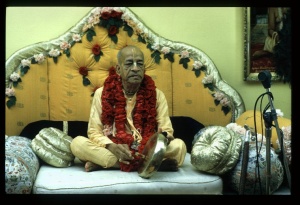SB 10.13.45: Difference between revisions
m (1 revision(s)) |
(Vanibot #0054 edit - transform synonyms into clickable links, which search similar occurrences) |
||
| (One intermediate revision by one other user not shown) | |||
| Line 1: | Line 1: | ||
{{info | {{info | ||
|speaker= | |speaker=Śukadeva Gosvāmī | ||
|listener=King | |listener=King Parīkṣit | ||
}} | }} | ||
[[Category:Srimad-Bhagavatam - Canto 10 Chapter 13]] | |||
[[Category:Bhagavatam Verses Spoken by Sukadeva Gosvami - Vanisource|101345]] | |||
<div style="float:left">'''[[Srimad-Bhagavatam]] - [[SB 10|Tenth Canto]] - [[SB 10.13: The Stealing of the Boys and Calves by Brahma|Chapter 13: The Stealing of the Boys and Calves by Brahmā]]'''</div> | |||
<div style="float:right">[[File:Go-previous.png|link=SB 10.13.44]] '''[[SB 10.13.44]] - [[SB 10.13.46]]''' [[File:Go-next.png|link=SB 10.13.46]]</div> | |||
{{RandomImage}} | |||
==== TEXT 45 ==== | ==== TEXT 45 ==== | ||
<div | <div class="verse"> | ||
tamyāṁ tamovan naihāraṁ | :tamyāṁ tamovan naihāraṁ | ||
khadyotārcir ivāhani | :khadyotārcir ivāhani | ||
mahatītara-māyaiśyaṁ | :mahatītara-māyaiśyaṁ | ||
nihanty ātmani yuñjataḥ | :nihanty ātmani yuñjataḥ | ||
</div> | </div> | ||
| Line 17: | Line 22: | ||
==== SYNONYMS ==== | ==== SYNONYMS ==== | ||
<div | <div class="synonyms"> | ||
''[//vanipedia.org/wiki/Special:VaniSearch?s=tamyām&tab=syno_o&ds=1 tamyām]'' — on a dark night; ''[//vanipedia.org/wiki/Special:VaniSearch?s=tamaḥ&tab=syno_o&ds=1 tamaḥ]-[//vanipedia.org/wiki/Special:VaniSearch?s=vat&tab=syno_o&ds=1 vat]'' — just as darkness; ''[//vanipedia.org/wiki/Special:VaniSearch?s=naihāram&tab=syno_o&ds=1 naihāram]'' — produced by snow; ''[//vanipedia.org/wiki/Special:VaniSearch?s=khadyota&tab=syno_o&ds=1 khadyota]-[//vanipedia.org/wiki/Special:VaniSearch?s=arciḥ&tab=syno_o&ds=1 arciḥ]'' — the light of a glowworm; ''[//vanipedia.org/wiki/Special:VaniSearch?s=iva&tab=syno_o&ds=1 iva]'' — just as; ''[//vanipedia.org/wiki/Special:VaniSearch?s=ahani&tab=syno_o&ds=1 ahani]'' — in the daytime, in the sunlight; ''[//vanipedia.org/wiki/Special:VaniSearch?s=mahati&tab=syno_o&ds=1 mahati]'' — in a great personality; ''[//vanipedia.org/wiki/Special:VaniSearch?s=itara&tab=syno_o&ds=1 itara]-[//vanipedia.org/wiki/Special:VaniSearch?s=māyā&tab=syno_o&ds=1 māyā]'' — inferior mystic potency; ''[//vanipedia.org/wiki/Special:VaniSearch?s=aiśyam&tab=syno_o&ds=1 aiśyam]'' — the ability; ''[//vanipedia.org/wiki/Special:VaniSearch?s=nihanti&tab=syno_o&ds=1 nihanti]'' — destroys; ''[//vanipedia.org/wiki/Special:VaniSearch?s=ātmani&tab=syno_o&ds=1 ātmani]'' — in his own self; ''[//vanipedia.org/wiki/Special:VaniSearch?s=yuñjataḥ&tab=syno_o&ds=1 yuñjataḥ]'' — of the person who attempts to use. | |||
</div> | </div> | ||
| Line 24: | Line 29: | ||
==== TRANSLATION ==== | ==== TRANSLATION ==== | ||
<div | <div class="translation"> | ||
As the darkness of snow on a dark night and the light of a glowworm in the light of day have no value, the mystic power of an inferior person who tries to use it against a person of great power is unable to accomplish anything; instead, the power of that inferior person is diminished. | As the darkness of snow on a dark night and the light of a glowworm in the light of day have no value, the mystic power of an inferior person who tries to use it against a person of great power is unable to accomplish anything; instead, the power of that inferior person is diminished. | ||
</div> | </div> | ||
| Line 31: | Line 36: | ||
==== PURPORT ==== | ==== PURPORT ==== | ||
<div | <div class="purport"> | ||
When one wants to supersede a superior power, one's own inferior power becomes ludicrous. Just as a glowworm in the daytime and snow at night have no value, Brahmā's mystic power became worthless in the presence of Kṛṣṇa, for greater mystic power condemns inferior mystic power. On a dark night, the darkness produced by snow has no meaning. The glowworm appears very important at night, but in the daytime its glow has no value; whatever little value it has is lost. Similarly, Brahmā became insignificant in the presence of Kṛṣṇa's mystic power. Kṛṣṇa's māyā was not diminished in value, but Brahmā's māyā was condemned. Therefore, one should not try to exhibit one's insignificant opulence before a greater power. | When one wants to supersede a superior power, one's own inferior power becomes ludicrous. Just as a glowworm in the daytime and snow at night have no value, Brahmā's mystic power became worthless in the presence of Kṛṣṇa, for greater mystic power condemns inferior mystic power. On a dark night, the darkness produced by snow has no meaning. The glowworm appears very important at night, but in the daytime its glow has no value; whatever little value it has is lost. Similarly, Brahmā became insignificant in the presence of Kṛṣṇa's mystic power. Kṛṣṇa's ''māyā'' was not diminished in value, but Brahmā's ''māyā'' was condemned. Therefore, one should not try to exhibit one's insignificant opulence before a greater power. | ||
</div> | </div> | ||
__NOTOC__ | |||
<div style="float:right; clear:both;">[[File:Go-previous.png|link=SB 10.13.44]] '''[[SB 10.13.44]] - [[SB 10.13.46]]''' [[File:Go-next.png|link=SB 10.13.46]]</div> | |||
__NOTOC__ | |||
__NOEDITSECTION__ | |||
Latest revision as of 18:24, 17 February 2024

A.C. Bhaktivedanta Swami Prabhupada
TEXT 45
- tamyāṁ tamovan naihāraṁ
- khadyotārcir ivāhani
- mahatītara-māyaiśyaṁ
- nihanty ātmani yuñjataḥ
SYNONYMS
tamyām — on a dark night; tamaḥ-vat — just as darkness; naihāram — produced by snow; khadyota-arciḥ — the light of a glowworm; iva — just as; ahani — in the daytime, in the sunlight; mahati — in a great personality; itara-māyā — inferior mystic potency; aiśyam — the ability; nihanti — destroys; ātmani — in his own self; yuñjataḥ — of the person who attempts to use.
TRANSLATION
As the darkness of snow on a dark night and the light of a glowworm in the light of day have no value, the mystic power of an inferior person who tries to use it against a person of great power is unable to accomplish anything; instead, the power of that inferior person is diminished.
PURPORT
When one wants to supersede a superior power, one's own inferior power becomes ludicrous. Just as a glowworm in the daytime and snow at night have no value, Brahmā's mystic power became worthless in the presence of Kṛṣṇa, for greater mystic power condemns inferior mystic power. On a dark night, the darkness produced by snow has no meaning. The glowworm appears very important at night, but in the daytime its glow has no value; whatever little value it has is lost. Similarly, Brahmā became insignificant in the presence of Kṛṣṇa's mystic power. Kṛṣṇa's māyā was not diminished in value, but Brahmā's māyā was condemned. Therefore, one should not try to exhibit one's insignificant opulence before a greater power.